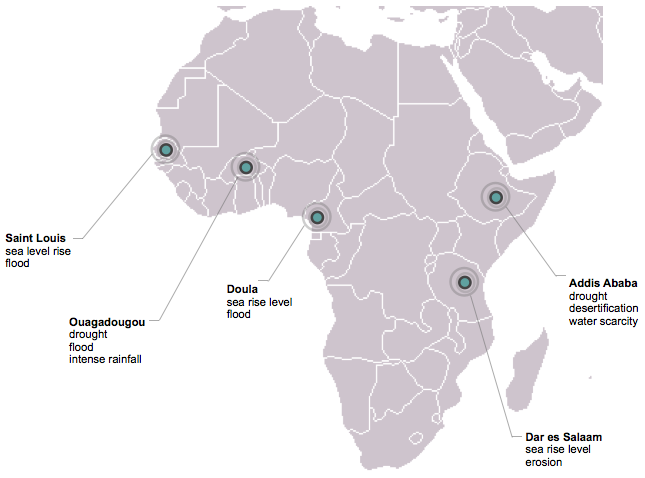CLUVA - Climate Change and Urban Vulnerability in Africa

UFZ project lead
Department of Urban and Environmental Sociology
UFZ personnel
Department of Urban and Environmental Sociology
Duration
12/2010 – 11/2013
Contextual background
At present, the rapid transformation of African cities is influenced by local, regional and global multidimensional forces that demand more attention on the urban dimension of African settlements. As it is forecasted, African communities will become more urbanised between 2000 and 2030, and with this physical shift comes environmental and social adversities such as pollution, gender and education disparities, food scarcity, access to water and sanitation among other burdens.
Urban vulnerability in Africa is a function of anthropogenic factors that may influence the susceptibility of local communities to environmental risk. The need to transcend unilateral perspectives is central to address current and future challenges in Africa. This is done by reflecting on different set of characteristics, (social realities, demographic conditions, as well as the economic and political backgrounds) that determine vulnerability.
The cyclical loop between urban areas and environmental problems is more obvious when examining climate change related issues. Several African cities, while showing signs of development and growth are paradoxically becoming more at risk. Their exposure to a hazard is substantiated by a series of cumulative flood, drought and sea rise level circumstances, which have been observed in recent years. African nations need to absorb the social, economic and environmental impact caused by natural disasters. Climate change related hazards are likely to aggravate their current state if efforts to improve their coping and resilient capacities are not undertaken.
CLUVA’s main objective
CLUVA aims at developing context-centred methods to assess vulnerability and increase knowledge regarding the management of climate related risks. CLUVA also seeks to build the capacity of scientists in Saint Louis, Senegal; Douala, Cameroon; Ouagadougou, Burkina Faso; Addis Ababa, Ethiopia and Dar es Salaam, Tanzania. These cities feature different urban conditions and climatic configurations.
CLUVA examines the following issues:
- climate change
- social vulnerability
- resilience
- risk management
- adaptation
Selected natural disasters faced by CLUVA partners in Africa:

CLUVA Partners
The CLUVA project is an integrated effort between seven European institutions and six African research establishments. Experts in climate hazard and risk assessment, risk management, eco-system, urban planning, governance, urban systems and social vulnerability collaborate to improve the capacity of scientific institutions to cope with hazard related events. This multidisciplinary consortium will work in close collaboration on selected case study cities to propose innovative resilience strategies for selected west and east African cities.
CLUVA European partners are:
AMRA, Analysis and Monitoring of Environmental Risks, Italy - Project coordinator
KU, University of Copenhagen, Danish Centre for Forest Landscape and Planning, Denmark
UM, University of Manchester, School of Environment and Development, UK
TUM, Technical University of Munich, Germany
CMCC, Euromediterranean Center of Climate Changes, Italy
UFZ, Helmholtz Centre for Environmental Research, Germany
NIBR, Norwegian Institute of Urban and Regional Research, Norway
CLUVA African partners are:
UGB, Université Gaston Berger, Sénégal
UY1-ENSP, Ecole nationale Supérieure Polytechnique Université Yaoundé 1, Cameroun
UO, University of Ougadougou, Burkina Faso
ARU, Ardhi University Tanzania, Tanzania
EIABC AAU, Ethiopian Institute of Architecture, Building Construction and City Development, Ethiopia
CSIR, Council for Scientific and Industrial Research, South Africa
Assessing Social vulnerability (WP2/Task 2.3) Lead by UFZ
A central task in CLUVA lies in assessing the social vulnerability of populations and urban territories in relation to disasters. The key point therefore is to highlight different dimensions of understanding and conceptualizing the condition of people when affected by a hazard. Highlighting therefore different dimensions of a disaster and focusing on the question of how individuals and social groups anticipate, resist and cope with, as well as recover from hazardous climatic events.
A close collaboration with selected case study partners is required for an in depth investigation in order to formulate appropriate recommendations for community-specific adaptation measures. This includes the selection of case study areas, identification of local authorities and acting institutions and the individuals. UFZ’s case study cities in Task 2.3 are Addis Ababa, Dar es Salaam and Ouagadougou.
CLUVA Workshops
Past workshops within CLUVA case study cities were held in order to elaborate a common understanding on key terms of social vulnerability and to provide a forum for discussing specific approaches to assess the degree to which vulnerable groups in each study area are affected. Moreover, relevant questions addressed to selected local stakeholders helped strengthen the whole CLUVA project and ensured local participation in case study cities.
Selected publications
Jean-Baptiste, N.; Kuhlicke, C.; Kunath, A.; Kabisch, S. (2011): Review and evaluation of existing vulnerability indicators in order to obtain an appropriate set of indicators for assessing climate related vulnerability. Project report for Task 2.3, D2.11.
The State of African Cities 2010. Governance, Inequality and Urban Land Markets. UN-HABITAT report. Nairobi, November 2010

